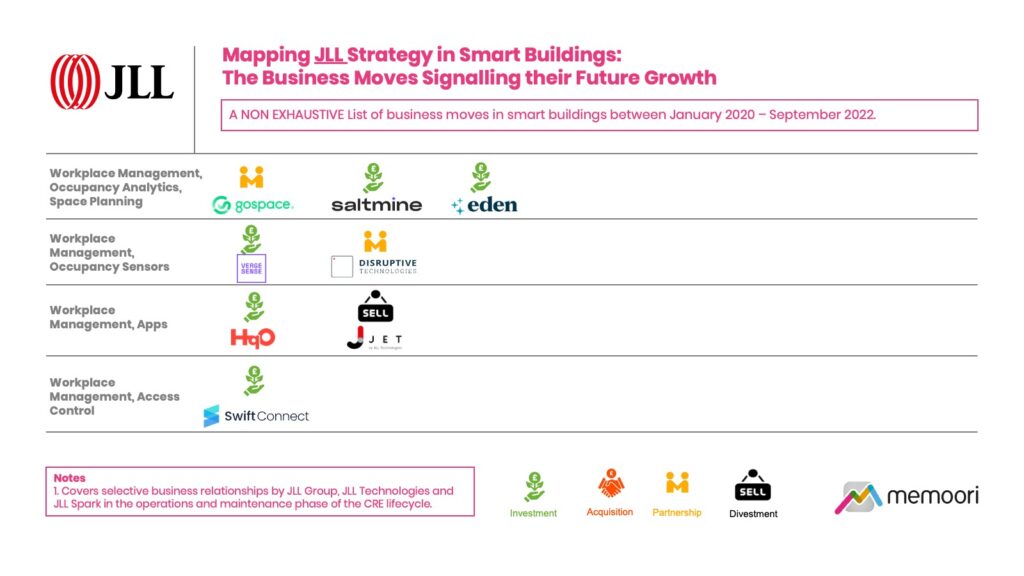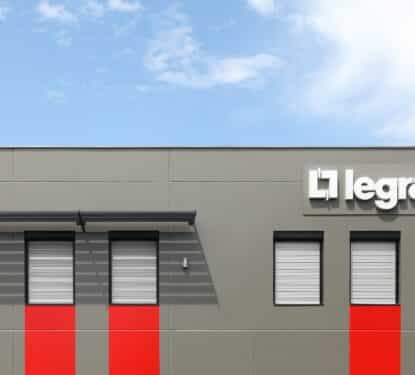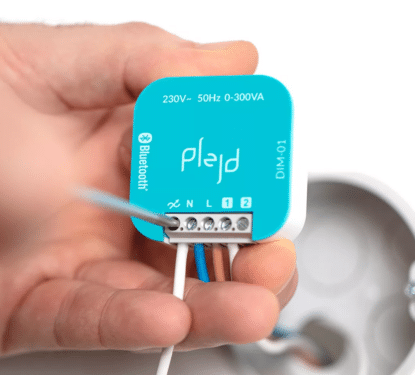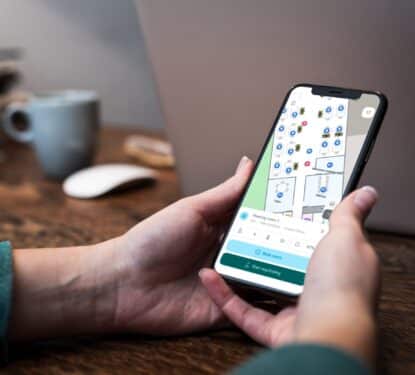This Research Note examines the emerging strategic priorities of JLL in the smart commercial buildings space. We have mapped M&A, divestments, strategic partnerships and investment activity to ascertain the growth ambitions of the company, by categorizing the various business relationships by technology and investment type over a 3-year period. This article, Part 2 of a 2-part analysis, is intended as a non-exhaustive indicator of JLL’s strategic direction between January 2020 and September 2022. Part 1 can be found here - https://memoori.com/mapping-the-strategic-direction-of-jll-in-the-smart-buildings-space-part-1/
JLL is one of the largest real estate service providers in the world, with 2021 revenue of $19.4 billion, operations in over 80 countries and a global workforce of more than 100,000. Founded in 2017, JLL Spark has invested more than $340 million in more than forty early-stage PropTech startups. The JLL Spark team, now part of JLL Technology, focuses on five investment themes relevant to JLL clients and the real estate industry, identified through client demand and adoption trends, including Smart Buildings. Note that this Research Note focuses on JLL partners offering technology for the operations and maintenance phase of the commercial real estate lifecycle.
Our strategy mapping exercise highlights 3 partnerships, 6 acquisitions, 1 divestment and 11 venture capital investments of relevance over the last three years.

The commentary below highlights their key investments and partnerships in the Digital Workplace sector.
Occupancy Analytics, Space Planning
In February 2021, JLL partnered with GoSpace AI, a UK-based startup that has developed proprietary AI that delivers dynamic resource allocation for corporate real estate. GoSpace's Artificially Intelligent Dynamic Resource Allocation engine (AIDRA), creates a dynamic occupancy planning and management offering featuring what is claimed to be “the most advanced space optimization capability in the industry.”
JLL's micro supply demand methodology leverages AIDRA to expand and contract office and footprint needs on a real-time basis, with an integrated view on the demand for space. The combination of several JLL technologies with AIDRA will activate dynamic zones, rather than static space assignments, an approach which grows or shrinks based on the ever-changing number of occupants coming into the physical workplace.
Occupancy Sensors
In March 2021, JLL announced a global reseller agreement with Vergesense, a provider of real-time occupancy sensors, powered by patented AI and object-detection models, that are accurate across a variety of space types. And in November 2021, JLL Spark participated in a $60 million Series C funding round, having previously backed the company since 2018.
Disruptive Technologies, the Norwegian creator of “the world’s smallest commercial-grade wireless sensors”, announced a global reseller agreement with JLL in January 2021, establishing the company as a certified supplier, with their products available in the JLL Marketplace.
Workplace Management Apps
In December 2021, JLL announced a strategic investment in HqO to enhance tenant engagement and experience across its portfolio of managed buildings. Composed of an app, analytics suite, hybrid work tools, and a flex space management system, the HqO platform allows JLL’s Experience Management group to streamline the workplace experiences delivered to tenants through an easy-to-use app and provide valuable data and feedback for landlords to make more informed decisions that drive greater tenant engagement.
And in July 2022, in a further deepening of the strategic relationship, JLL announced it would now directly sell HqO workplace experience app, as part of a newly established global licensing deal. Additionally, HqO acquired JLL Jet, a hybrid workplace app, to enrich its platform.
Access Control
In October 2021, JLL Spark co-led a $9 million fundraising round for SwiftConnect, a software provider enabling the hybrid work environment by integrating with existing building and suite-level access control systems, which typically span multiple disparate and disconnected providers. SwiftConnect’s software consolidates these siloed systems into a single cloud-enabled network, allowing an employee anywhere in the world to use a single credential to access any location, and allowing building owners and enterprises to centrally manage the adding or deleting of credentials and setting access permissions.
JLL has highlighted in its recent Future of Work Survey 2022 that technology and data will be critical foundations in the future of real estate operations. The real estate service provider has been a significant player in PropTech and smart building technologies since 2015. Memoori currently ranks JLL as the top investor in the smart buildings space.
This article was written by Daphne Tomlinson, Senior Research Associate at Memoori.



